
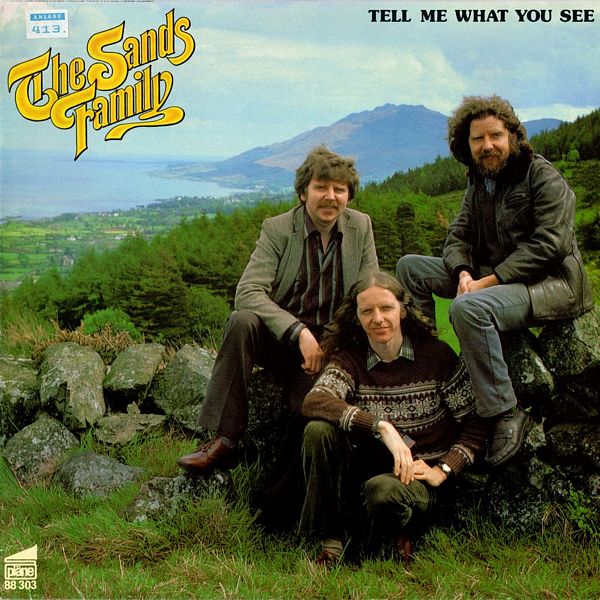 |
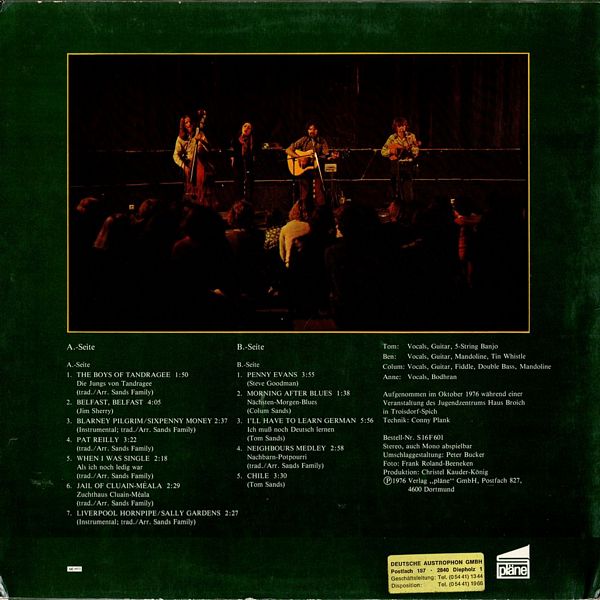
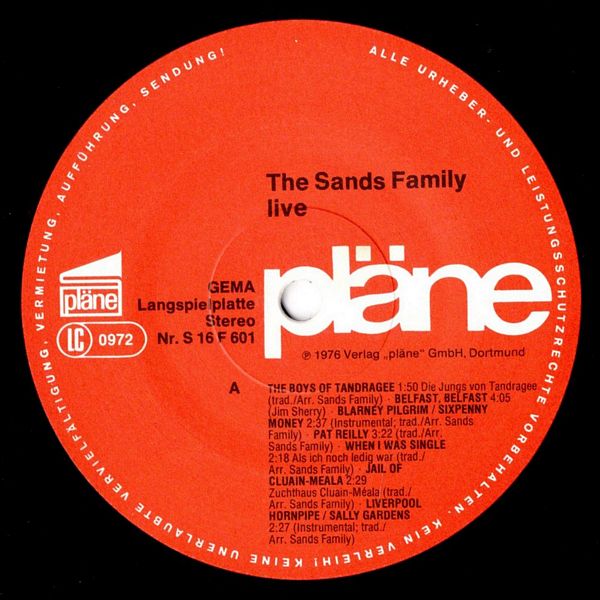
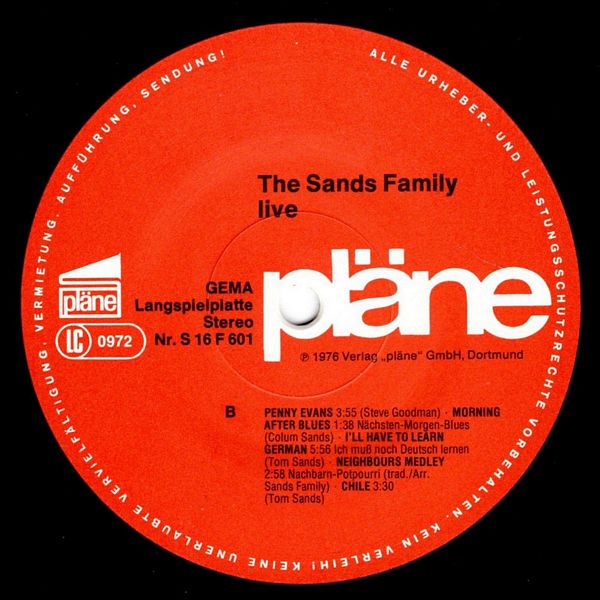 |
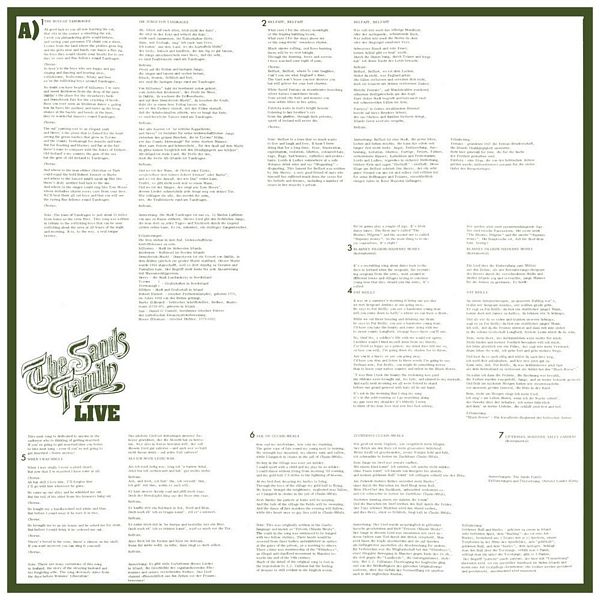
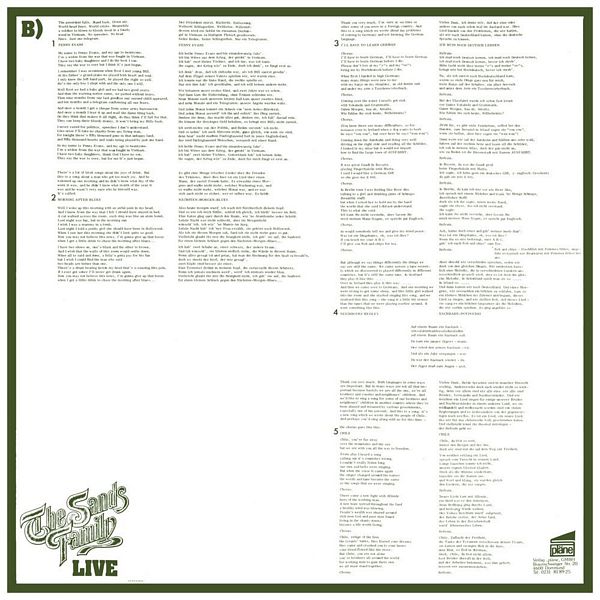 |
Sleeve Notes
Johnny I Hardly Knew You — An old anti-war song written in a simple but effective form. The bitter comments of the abandoned woman when she sees what is left of her husband, who comes home from the war limping, paint an unforgettable picture of the nothingness and horror of the war. We have partially rewritten the last verse to make it clear that this song is just as important today as it was 100 years ago.
Paddy's Green Shamrock Shore — This song is an emigration song, a theme that is very often treated in Irish songs, and a theme that unfortunately is still as current today as it was at the time this song was written. Although "Derry Quay" stops shipping ships to America, many young people, especially from Donegal and Derry, are still moving to America, England, and other countries, looking for work, a livelihood.
Kellie's Return, Go to the Well for Water & The Merry Blacksmith — These 3 melodies demonstrate three different Irish dance rhythms Hornpipe, Jig and Reel. Ben wrote the first tune himself, the other two are traditional melodies that we learned from our parents.
Dear Uncle Sam — Colum wrote this song in June 1981 during a visit to the BRD. He discovered at that time that the latest American cultural export to Germany was the television series "Dallas", another gift from Uncle Sam and probably not the last one: other "gifts" in the form of Pershing missiles are under discussion. Colum imagined a German writing a thank-you letter for all the gifts Uncle Sam has sent us over the last few decades.
Open Up Your Prison Gates — As a child, I often peeked under the flat stones in the meadows at home and watched as the darkness was dominated by a few large crawling and crawling creatures that tyrAnneized the weaker ones. When I took the stone and put light under the stone, these great dark spiders immediately hunted for other shadows, new darkness, to set up their prisons of exploitation there again. If more light came to Northern Ireland, there would be a lot of black shadows escaping in all directions and the others would be free to build a new world.
Orange is the color of loyalists in Northern Ireland; it has its origins in William of Orange, who won the crucial Battle of the Boyne for the English in 1690.
Green is the national color of Ireland, in Northern Ireland symbolic of the Republicans.
Children of The Dole — It seems that much more money is now spent on the art of killing people than on the art of letting them live in an acceptable mAnner. When money is needed for war, or "war games," it is available in millions, but when money is needed to fight poverty and unemployment, people either have to wait a long time, go on strike, or beg for it. In Northern Ireland, the unemployment rate is 28%, the highest in Western Europe. Conversely, a government that is disloyal to its people cAnneot expect loyalty or respect. "Frankie Brown" can give a lot to society, and yet society makes him suffer, squandering his abilities, and this social order will suffer and fall to the same extent.
The Boys of Mullaghbawn — Mullaghbawn is a small mountain village in South Armagh. This song was probably written at the beginning of the 19th century and refers to the "union" or union of a group of small peasants against the hard feudalism of the time, forced into exile and transported abroad, far from the hills of Mullaghbawn.
Me Elroy's Polka, The Twilight Jig & The Boys of the Lough — The polka was written by a man named Me Elroy from County Down, the jig was written by Colum and "The Boys of the Lough" is a well-known traditional reel.
Going to Morrow — The tongue twister's humor is based on a pun and it is absolutely necessary to understand English if you want to understand the problems that arise when someone wants to drive to tomorrow today and return tomorrow morning. If you do not understand English, you might comfort yourself that the officer at the ticket counter did not understand our traveler either; with the result that he did not arrive in the morning on that day.
The Last House in Our Street — In April 1982, the Sands Family had a gig on Cyprus Street in Belfast. Colum writes: "We had the address where the performance should take place, but when we arrived at the specified street, it seemed totally uninhabited and abandoned. All the windows were bricked up and stared at one another like blind eyes. We thought it was a mistake, and we were about to continue driving when we noticed a little girl playing ball at the other end of the street. As asked for the address and she led us through scree and empty houses in a backyard to the hall in which we were to play. I wrote this song about the little girl who was playing alone in a street, in a world few people know or want to know about."